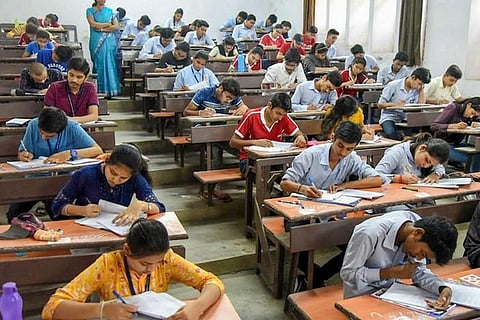

New Delhi: In a continuation of sorts to the growing list of qualifying examinations required for entry into higher education institutes in India, applications for the Common University Entrance Test or CUET kicked off last week.
Conducted by the National Testing Agency, this will be the qualifying exam for students seeking admission to graduate and post graduate courses in Central universities across India from the academic year 2022-23.
It was in November 2021 that the UGC’s Joint Secretary Jitendra K Tripathi had informed Vice-Chancellors of all 45 Central varsities that the examination can be conducted from this year onward.
It was also mentioned that State, private and deemed to be universities may also adopt the CUET for admissions to institutions affiliated to them.
Students keen on pursuing arts, sciences, humanities, languages and vocational courses from Central varsities will fall under the ambit of this exam which will test candidates on both the subject matter as well as aptitude.
In Tamil Nadu, Chief Minister MK Stalin moved a resolution urging the Union government to withdraw the CUET, and it was passed with active support from Opposition benches in the Assembly on Monday.
In a letter to the PM, Stalin argued that just like how it was done with NEET, the CUET is a prelude to the Centre’s larger attempts to centralise higher education in the country.
The CM believes that the CUET is a regressive measure that will sideline the multi-hued school education systems across India and ignore the importance of long-form based learning.
This could also increase the reliance of students on coaching centres to clear the exam.
One of the key points raised by the CM is that such entrance exams give an undue advantage to students who learned under the CBSE/NCERT syllabus.
Also, in most States, 80% of the total student population is made up of State board students, many of whom hail from economically challenged milieus. It might be hard for many of them to make the transition to more expensive CBSE schools.
This is especially pertinent to Tamil Nadu, which has been fighting a tooth and nail battle for repealing NEET, and has seen the loss of many bright students, who succumbed to the pressure of the exam.
Policy experts believe it might not be the best recourse to disregard the performance of students in the most important school years — Class 11 and Class 12. The reliance on the entrance exam invalidates efforts made by students in these years. They are instead herded into coaching classes that would make a killing from such new qualifying exams.
CUET advocates say the centralisation of the admission process could help curb corruption on the university level.
Some have said having one CUET ensures economically weak students do not have to spend extensively on travelling to examination centres located in hubs.
Other stakeholders are critical of the entire ecosystem of various State syllabi. Different State boards follow different modes of evaluation, which are at times, even subjected to moderation, through the granting of grace marks that help the State in achieving a desired outcome, vis-a-vis pass percentage.
However, it’s worth remembering that even today, access to quality education involves a certain degree of privilege. When it comes to the aptitude aspects of such entrance exams, a lot of children aspiring for courses such as literature or humanities might not have had exposure to the kind of books or reference materials that might be a prerequisite for sitting for the exam.
What might be expected of such students in the exams might be information that they might learn for the first time only once they enter the course, which essentially defeats the whole purpose of the exam.
Visit news.dtnext.in to explore our interactive epaper!
Download the DT Next app for more exciting features!
Click here for iOS
Click here for Android